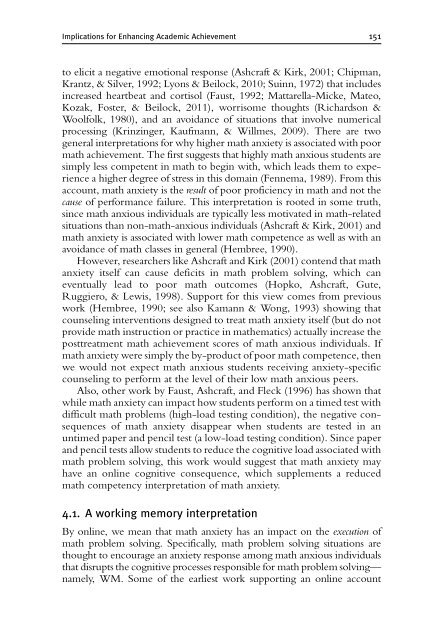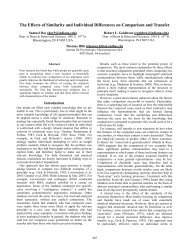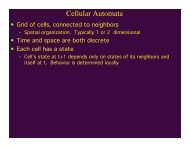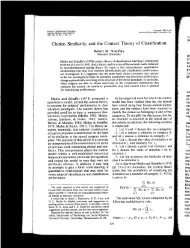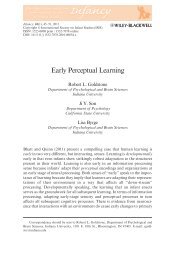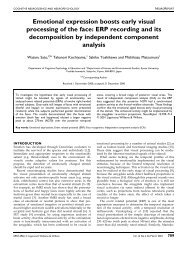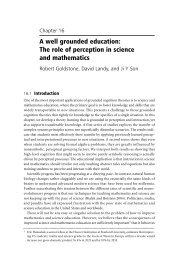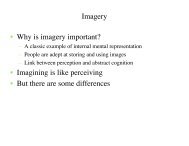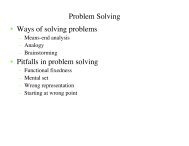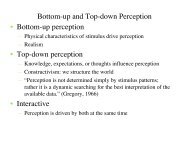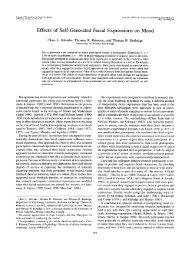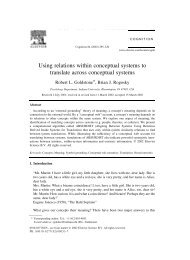- Page 3 and 4:
Series EditorBRIAN H. ROSSBeckman I
- Page 5 and 6:
Academic Press is an imprint of Els
- Page 7 and 8:
viContents3. Science of Multimedia
- Page 9 and 10:
This Page Intentionally Left Blank
- Page 11 and 12:
xContributorsHenry L. Roediger, III
- Page 13 and 14:
xiiPrefaceand there has been much e
- Page 15 and 16:
xivPrefaceInterventions for improvi
- Page 17 and 18:
2 Henry L. Roediger et al.delayed t
- Page 19 and 20:
4 Henry L. Roediger et al.an indire
- Page 21 and 22:
6 Henry L. Roediger et al.[(Figure_
- Page 23 and 24:
8 Henry L. Roediger et al.[(Figure_
- Page 25 and 26:
10 Henry L. Roediger et al.seems so
- Page 27 and 28:
12 Henry L. Roediger et al.interpre
- Page 29 and 30:
14 Henry L. Roediger et al.Table 2
- Page 31 and 32:
16 Henry L. Roediger et al.improved
- Page 33 and 34:
18 Henry L. Roediger et al.this mat
- Page 35 and 36:
20 Henry L. Roediger et al.length o
- Page 37 and 38:
22 Henry L. Roediger et al.9. BENEF
- Page 39 and 40:
24 Henry L. Roediger et al.subjects
- Page 41 and 42:
26 Henry L. Roediger et al.feedback
- Page 43 and 44:
28 Henry L. Roediger et al.supporti
- Page 45 and 46:
30 Henry L. Roediger et al.of some
- Page 47 and 48:
32 Henry L. Roediger et al.Benefit
- Page 49 and 50:
34 Henry L. Roediger et al.Hasher,
- Page 51 and 52:
36 Henry L. Roediger et al.Son, L.
- Page 53 and 54:
38 John Sweller1. INTRODUCTIONCogni
- Page 55 and 56:
40 John Sweller‘‘baby-talk.’
- Page 57 and 58:
42 John Swellerof cognitive or meta
- Page 59 and 60:
44 John SwellerTable 1Natural Infor
- Page 61 and 62:
46 John Swellerconfigurations. A ch
- Page 63 and 64:
48 John Swellerreproduction results
- Page 65 and 66:
50 John Swellerto mutation, without
- Page 67 and 68:
52 John Swellerusing a complex or,
- Page 69 and 70:
54 John SwellerThe human cognitive
- Page 71 and 72:
56 John Swellerepigenetic system ha
- Page 73 and 74:
58 John SwellerWe can determine lev
- Page 75 and 76:
60 John Swellerthan memorizing the
- Page 77 and 78:
62 John SwellerTable 2EffectVariabi
- Page 79 and 80:
64 John Swelleroccurs when students
- Page 81 and 82:
66 John Sweller3.3.3. The Split-Att
- Page 83 and 84:
68 John Swellermerely restates the
- Page 85 and 86:
70 John SwellerThe expertise revers
- Page 87 and 88:
72 John Swellerobtained a reverse m
- Page 89 and 90:
74 John Swelleractivities that othe
- Page 91 and 92:
76 John SwellerRenkl, A. (2005). Th
- Page 93 and 94:
78 Richard E. Mayercognitive theory
- Page 95 and 96:
80 Richard E. Mayerpictures beginni
- Page 97 and 98:
82 Richard E. MayerThe dualchannelp
- Page 99 and 100:
84 Richard E. Mayerlearner selects
- Page 101 and 102:
86 Richard E. MayerRosenthal, Rosno
- Page 103 and 104:
88 Richard E. MayerGenerative proce
- Page 105 and 106:
90 Richard E. Mayer4.2. Evidence-ba
- Page 107 and 108:
92 Richard E. Mayersituation could
- Page 109 and 110:
94 Richard E. Mayer(Moreno & Mayer,
- Page 111 and 112:
96 Richard E. Mayer4.3.1. Segmentin
- Page 113 and 114:
98 Richard E. Mayerpresenting the w
- Page 115 and 116: 100 Richard E. MayerThe multimedia
- Page 117 and 118: 102 Richard E. Mayergame in industr
- Page 119 and 120: 104 Richard E. MayerClark, R. C., &
- Page 121 and 122: 106 Richard E. MayerMayer, R. E., &
- Page 123 and 124: 108 Richard E. MayerSweller, J. (19
- Page 125: 110 Timothy J. Nokes and Daniel M.
- Page 128 and 129: Incorporating Motivation into a The
- Page 130 and 131: Incorporating Motivation into a The
- Page 132 and 133: Incorporating Motivation into a The
- Page 134 and 135: Incorporating Motivation into a The
- Page 136 and 137: Incorporating Motivation into a The
- Page 138 and 139: Incorporating Motivation into a The
- Page 140 and 141: Incorporating Motivation into a The
- Page 142 and 143: Incorporating Motivation into a The
- Page 144 and 145: Incorporating Motivation into a The
- Page 146 and 147: Incorporating Motivation into a The
- Page 148 and 149: Incorporating Motivation into a The
- Page 150 and 151: Incorporating Motivation into a The
- Page 152 and 153: CHAPTERFIVEOn the Interplay of Emot
- Page 154 and 155: Implications for Enhancing Academic
- Page 156 and 157: Implications for Enhancing Academic
- Page 158 and 159: Implications for Enhancing Academic
- Page 160 and 161: Implications for Enhancing Academic
- Page 162 and 163: Implications for Enhancing Academic
- Page 164 and 165: Implications for Enhancing Academic
- Page 168 and 169: Implications for Enhancing Academic
- Page 170 and 171: Implications for Enhancing Academic
- Page 172 and 173: Implications for Enhancing Academic
- Page 174 and 175: Implications for Enhancing Academic
- Page 176 and 177: Implications for Enhancing Academic
- Page 178 and 179: Implications for Enhancing Academic
- Page 180 and 181: Implications for Enhancing Academic
- Page 182 and 183: Implications for Enhancing Academic
- Page 184 and 185: Implications for Enhancing Academic
- Page 186 and 187: CHAPTERSIXThere Is Nothing So Pract
- Page 188 and 189: There Is Nothing So Practical as a
- Page 190 and 191: There Is Nothing So Practical as a
- Page 192 and 193: There Is Nothing So Practical as a
- Page 194 and 195: There Is Nothing So Practical as a
- Page 196 and 197: There Is Nothing So Practical as a
- Page 198 and 199: There Is Nothing So Practical as a
- Page 200 and 201: There Is Nothing So Practical as a
- Page 202 and 203: There Is Nothing So Practical as a
- Page 204 and 205: There Is Nothing So Practical as a
- Page 206 and 207: There Is Nothing So Practical as a
- Page 208 and 209: There Is Nothing So Practical as a
- Page 210 and 211: There Is Nothing So Practical as a
- Page 212 and 213: There Is Nothing So Practical as a
- Page 214 and 215: CHAPTERSEVENThe Power of Comparison
- Page 216 and 217:
The Power of Comparison in Learning
- Page 218 and 219:
The Power of Comparison in Learning
- Page 220 and 221:
The Power of Comparison in Learning
- Page 222 and 223:
The Power of Comparison in Learning
- Page 224 and 225:
The Power of Comparison in Learning
- Page 226 and 227:
The Power of Comparison in Learning
- Page 228 and 229:
The Power of Comparison in Learning
- Page 230 and 231:
The Power of Comparison in Learning
- Page 232 and 233:
The Power of Comparison in Learning
- Page 234 and 235:
The Power of Comparison in Learning
- Page 236 and 237:
The Power of Comparison in Learning
- Page 238 and 239:
The Power of Comparison in Learning
- Page 240 and 241:
The Power of Comparison in Learning
- Page 242 and 243:
CHAPTEREIGHTThe Ubiquitous Patterns
- Page 244 and 245:
The Ubiquitous Patterns of Incorrec
- Page 246 and 247:
The Ubiquitous Patterns of Incorrec
- Page 248 and 249:
The Ubiquitous Patterns of Incorrec
- Page 250 and 251:
The Ubiquitous Patterns of Incorrec
- Page 252 and 253:
The Ubiquitous Patterns of Incorrec
- Page 254 and 255:
The Ubiquitous Patterns of Incorrec
- Page 256 and 257:
The Ubiquitous Patterns of Incorrec
- Page 258 and 259:
The Ubiquitous Patterns of Incorrec
- Page 260 and 261:
The Ubiquitous Patterns of Incorrec
- Page 262 and 263:
The Ubiquitous Patterns of Incorrec
- Page 264 and 265:
The Ubiquitous Patterns of Incorrec
- Page 266 and 267:
The Ubiquitous Patterns of Incorrec
- Page 268 and 269:
The Ubiquitous Patterns of Incorrec
- Page 270 and 271:
The Ubiquitous Patterns of Incorrec
- Page 272 and 273:
The Ubiquitous Patterns of Incorrec
- Page 274 and 275:
The Ubiquitous Patterns of Incorrec
- Page 276 and 277:
The Ubiquitous Patterns of Incorrec
- Page 278 and 279:
The Ubiquitous Patterns of Incorrec
- Page 280 and 281:
The Ubiquitous Patterns of Incorrec
- Page 282 and 283:
The Ubiquitous Patterns of Incorrec
- Page 284 and 285:
CHAPTERNINEConceptual Problem Solvi
- Page 286 and 287:
Conceptual Problem Solving in Physi
- Page 288 and 289:
Conceptual Problem Solving in Physi
- Page 290 and 291:
Conceptual Problem Solving in Physi
- Page 292 and 293:
Conceptual Problem Solving in Physi
- Page 294 and 295:
Conceptual Problem Solving in Physi
- Page 296 and 297:
Conceptual Problem Solving in Physi
- Page 298 and 299:
Conceptual Problem Solving in Physi
- Page 300 and 301:
Conceptual Problem Solving in Physi
- Page 302 and 303:
Conceptual Problem Solving in Physi
- Page 304 and 305:
Conceptual Problem Solving in Physi
- Page 306 and 307:
Conceptual Problem Solving in Physi
- Page 308 and 309:
Conceptual Problem Solving in Physi
- Page 310 and 311:
Conceptual Problem Solving in Physi
- Page 312 and 313:
Conceptual Problem Solving in Physi
- Page 314 and 315:
IndexAAcademic performancedrive the
- Page 316 and 317:
Index 301Correct method comparison,
- Page 318 and 319:
Index 303LLabor in vain, 28Language
- Page 320 and 321:
Index 305OOntological categories of
- Page 322 and 323:
Index 307WWeb-delivered multimedia
- Page 324 and 325:
CONTENTS OF RECENT VOLUMESVolume 40
- Page 326 and 327:
Contents of Recent Volumes 311Under
- Page 328 and 329:
Contents of Recent Volumes 313Volum


